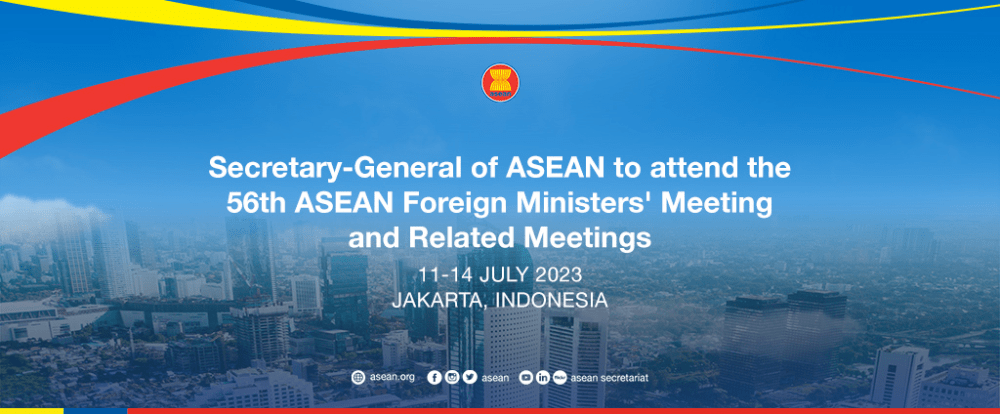RCAS Talk-ASEAN Won’t Take Sides!
Time: 2023-07-15 Author: RCAS
The Indonesian Foreign Minister, as the host, stressed in his opening speech at the ASEAN Foreign Ministers’ Meeting held in Jakarta on July 11 the need for ASEAN to maintain unity and centrality, and conveyed a clear message that ASEAN will never serve as a proxy for great power competition. The interviewed experts pointed out that ASEAN countries are reluctant to take sides and are trying to shape a benign competition among major powers in the region. The United States and Japan want to confront China through inveigling or alienating ASEAN members.This scheme will not come true.

▲the 56th ASEAN Foreign Ministers’ Meeting on 11-14 July 2023, Jakarta, Indonesia.
At the 56th ASEAN Foreign Ministers’ Meeting on July 11, Indonesian Foreign Minister Marsudi, the rotating presidency of ASEAN, said that ASEAN must maintain its credibility to maintain its unity and central position. Only with unity can ASEAN cope with challenges and foresee future. She also said, “We need to convey that ASEAN will never be a proxy of great power competition.”
Nian Peng, Director of the Research Centre for Asian Studies(RCAS), was interviewed by Hong Kong China News Agency on the 12th. He pointed out that the Indonesian Foreign Minister’s speech represented the mainstream view of ASEAN. Under the current intense great power rivalry, ASEAN conveyed several messages: Firstly, in recent years, there has been an escalation in competition between China and the United States. In that case, the United States has constantly pressured ASEAN to join the anti-China camp, which has marginalized ASEAN in regional affairs, therefore, ASEAN should strengthen its central position. Secondly, ASEAN tries to guide and shape a benign competition among major powers in the region, easing the external environment and avoiding being trapped in a situation where they had to choose sides.This is aimed at preserving long-term peace and stability in Southeast Asia. Thirdly, amidst the escalating risks of conflict between major powers, ASEAN has set the firm stance of upholding a nuclear-free zone.
On the same day, Marsudi also presided over the meeting of the Committee of Southeast Asia Nuclear-Weapon-Free Zone. She stressed that ASEAN wants to make Southeast Asia a nuclear-free zone with a very strong political will.
In this regard, Nian Peng explained that ASEAN had the exact same feeling about the Russian-Ukrainian conflict, and the United States provided weapons to Ukraine. So, ASEAN worries about the escalating risk of military conflict in Southeast Asia considering the current tensions in the Taiwan Strait. In addition, the United States and the Philippines have rapidly promoted military cooperation recently. The United States has also deployed nuclear weapons in Europe and anti-missile systems in South Korea. ASEAN countries are worried that the United States will plunge the whole Southeast Asia into a nuclear war. “At present, it is almost impossible for the United States to deploy nuclear weapons in ASEAN countries other than the Philippines. Indonesia has already rejected, while Thailand, Singapore, and Malaysia, which have military cooperation with the United States, limit their cooperation to normal activities without targeting third countries.”
In addition to the ASEAN Foreign Ministers’ Meeting, Indonesia will hold a series of meetings. Member of the Political Bureau of the CPC Central Committee and Director of the Office of the Central Commission for Foreign Affairs Wang Yi, U.S. Secretary of State Blinken, Russian Foreign Minister Lavrov and Japanese Foreign Minister Lin Fang will attend relevant meetings.
Before attending the meeting, the United States and Japan expressed their intentions through the media. According to US media reports, Blinken will focus on the South China Sea and cooperate with ASEAN member countries. The aim is to push back against what they perceive as China’s “harmful, coercive, and irresponsible behavior” that is on the rise. According to Japanese media reports, Lin Fang’s visit is to deepen relations with emerging market countries in the “global south” and encourage ASEAN countries to align closer with Japan. It aims to position Japan as a bridge between ASEAN and the G7, collectively constraining China.
Nian Peng pointed out that the United States and Japan work together on containing China through deepening security and economic cooperation with ASEAN. In terms of security, the United States hypes the “China threat” through the South China Sea dispute. However, except the Philippines, which actively follows the United States, other member countries focus on economic development and are unwilling to intensify conflicts in the South China Sea. Japan hopes that ASEAN and G7 will be closely tied, thus reducing its economic dependence on China. ASEAN will certainly welcome the economic support of G7 members, but it is unwilling to engage a zero-sum game in economic cooperation. ASEAN countries have a big vision with enough rationality and determination.
Despite the United States hypes up the South China Sea dispute ahead of the meeting, ASEAN appears to be relatively cautious on this matter. The first joint military exercise of ten ASEAN countries in the South China Sea, which will be held in September, was originally scheduled to be held in the North Natuna Sea, where Indonesia and China have overlapping economic waters. After Western media hype, Indonesia directly changed it to the undisputed exit location of the Straits of Malacca.
Nian Peng believes that it shows that ASEAN countries have different views on the military exercise. These countries are unwilling to intensify great power competition over the South China Sea dispute. ASEAN countries prefer not to pick sides and still hope to become a coordinator between major powers, maintaining ASEAN’s unity as a whole and avoiding being drawn into great power competition. The United States and Japan want to confront China through inveigling or alienating ASEAN members.This scheme will not come true.
This article is translated from the Chinese edition which was first published at Hong Kong China News Agency, http://www.hkcna.hk/docDetail.jsp?id=100411671&channel=2813

